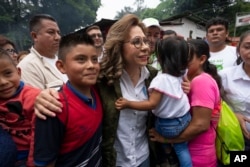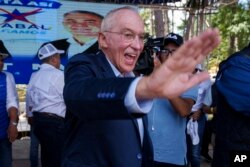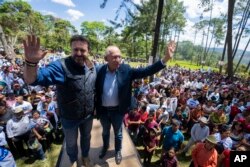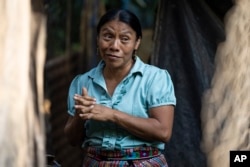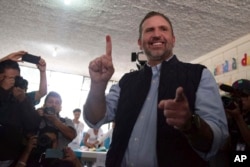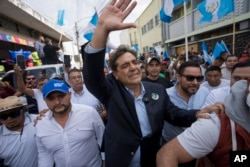The electoral process in Guatemala, which calls for the polls on Sunday to elect a president, vice president, members of Congress and other local authorities, started with setbacks from the moment of registration.
It has become one of the most turbulent electoral calls in the history of Guatemala due to controversial decisions by the electoral authority by denying the registration of some candidates, reversing the registration of others already registered and accepting the registration of some names that, a priori, presented incompatibilities. with the legislation of the Central American country.
In addition to the three presidential races barred so far, more than 1,200 candidates for vice president, mayor and congressional seats have also been kept off the ballot.
In Guatemala there is no re-election, so President Alejandro Giammattei is not running in the race.
WHAT IS AT STAKE IN SUNDAY’S VOTE?
Guatemalans over the age of 18 are called to the polls every four years.
Each voter will receive five ballots. Among them, there will be a white one with the faces of the 22 presidential candidates and a pink one with the logos of the political parties competing for mayors.
The presidency wins who obtains an absolute majority (50% plus one vote) in the first round; If there is not a winner with sufficient support, the two candidates with the most votes will be measured in a second round on August 20.
Voters will also receive a green ballot with those running for congressional deputies by national list, another blue one for legislators from the central district and, finally, a yellow ballot for the Central American Parliament.
Two days before the election, all parties must finish their electoral campaign, as well as the publication of surveys and opinion studies.
Some 9.2 million Guatemalans are registered and ready to vote. More than 50% of the voters are women.
HOW IS THE ELECTION OFFER IN GUATEMALA?
The Guatemalan population will be able to choose between a variety of political parties that walk mostly under a right-wing trend: there are 19 political pairings compared to three considered left-wing or progressive.
The three candidates with the most support, according to the latest polls, are precisely on the more conservative side of the spectrum: former first lady Sandra Torres, former diplomat Edmond Mulet and Zury Ríos Sosa, daughter of the late former dictator Efraín Ríos Montt. They focused their campaign proposals on offering a strong-arm policy, like the strategy of Salvadoran President Nayib Bukele.
On the left or progressive leadership side there are three options: the Seed movement, the URNG-Maíz coalition with the Winaq Political Movement and the VOS party. These proposals advocate for frontal anti-corruption fights, for the defense of the rights of vulnerable groups and indigenous populations, the strengthening of democracy and the recognition of a plural country.
WHO ARE THE THREE FAVORITE PAIRINGS?
Sandra Torres, ex-wife of former Social Democratic President Álvaro Colom (2008-2012), runs accompanied by Romeo Guerra, an evangelical pastor, despite the fact that the constitution prohibits candidates from being members of any religion. The vice-presidential candidate renounced his belief before registering and was endorsed by both the electoral authority and the Constitutional Court. The binomial offers solidarity food bags for vulnerable groups.
Zury Ríos Sosa proposes civil death for those convicted of corruption, applying the death penalty and protection of private property, as well as improving hospital infrastructure. His candidacy was questioned because the constitution prohibits de facto heads of state from running for office (as was his father between 1982 and 1983) and his relatives, up to the fourth degree of consanguinity.
Mulet offers free medicine and support to the elderly or single mothers. He was one of the few politicians who spoke out against the criminalization of journalists, which earned him a complaint from the Prosecutor’s Office, accusing him of obstruction of justice, which did not advance in court.
Mulet stated that, if he became president, he would end the administration of Attorney General Consuelo Porras, who is pointed out as the promoter of the persecution of justice operators. In 2021, the US government sanctioned Porras by withdrawing his entry visa for obstructing the fight against corruption and undermining democracy in Guatemala.
The three leading candidates also signed a proposal from radical groups in defense of life, family and freedom that advocates against sexual and reproductive rights and against the LGBTI community.
WHY THE IDEOLOGICAL IMBALANCE?
For almost 70 years, no leftist party has ruled the country. Between 1945 and 1954 there were two revolutionary governments: that of Juan José Arévalo Bermejo and Jacobo Arbenz Guzmán, who implemented social security, workers’ rights and promoted an agrarian reform, but which ended with a coup.
Following a series of right-wing military governments and a 36-year civil war (1960-1996), with the country’s return to democracy in 1986, the conservative trend has only been briefly interrupted twice by two centrist Social Democratic governments in 1986 and 2008.
The last four governments (General Otto Pérez Molina —2012-2015—, Alejandro Maldonado Aguirre —2015-2016—, Jimmy Morales —2016-2020— and Giammattei —2020-2024— have been led by the conservative and radical right, with accusations of corruption.
“The electorate is highly ideological, at the same time a non-partisan electorate, it does not identify with a party,” says Vaclav Masek, a Guatemalan sociologist and professor at the University of Southern California (USC) in the United States.
The scarce electoral offer is also due to a failed political system, says the academic, who recalls that Guatemalan political parties have a short life. “They get to their first pick, they race and they die, they don’t have enough power to keep going, they last about seven years,” he added.
WHAT CANDIDATES WERE EXCLUDED?
The Supreme Electoral Tribunal (TSE) is the governing body of the elections, however, the courts of justice have jurisdiction to resolve disagreements on the candidacies.
At the beginning of the year, the TSE cut short the candidacy of Thelma Cabrera, the only indigenous woman with a presidential aspiration, and her partner Jordán Rodas, former Human Rights attorney. They ran for the Movement for the Liberation of the Peoples (MLP) but an administrative inconvenience due to lack of a document left Rodas out and, with him, Cabrera.
The candidacies of the populist right-wing politicians Roberto Arzú and Carlos Pineda also fell off the ballot. The first by decision of the Supreme Electoral Tribunal for allegedly starting the campaign prematurely and the second, who was leading the polls for voting intentions, due to the challenge of his nomination by a rival before the courts.
These exclusions have been criticized by the United States and the Organization of American States, among other entities. Many think that this could occur at a high level of abstentionism.
Connect with the Voice of America! Subscribe to our channel Youtube and activate notifications, or follow us on social networks: Facebook, Twitter and instagram.













